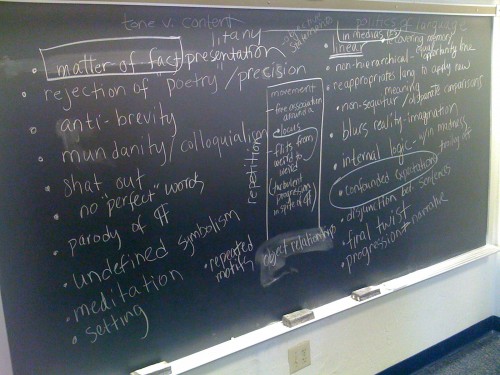Today in Class

The Definition of a Prose Poem
For the definition of a prose poem, as defined by my poetry class, see above. The class paired up with one prose poem per pair and, based on just that one poem, wrote a prose poetry manifesto (we read poems by Edson, Simic, Hass, Tate, Forché, Mullen, Bowman, Emanuel–most, but not all, from Great American Prose Poems). Funny to write a manifesto since we’d just read Russell Edson’s feelings on theorizing. Of the L=A=N=G=U=A=G=E poetry movement, Edson has said they are, “like painters who, instead of painting, spend their days smelling their brushes and easels thinking that a new age is about to dawn.” Of course, that kind of talk is always tinged with a little hypocrisy; there’s always a theory of writing. Maybe the difference is writing out of theory versus writing into theory. Age-old argument, really. Edson has this to say of his proses in his essay, “Portrait of the Writer as a Fat Man”:
A piece of writing must not only have the logic of language, but the logic of composition. Automatic writing doesn’t begin anyplace, and doesn’t end anyplace. It’s like a digestive system without a defined mouth or an asshole…. [My work] is not automatic writing. It’s looking for the shape of thought more than the particulars of the little narrative…. My pieces, when they work, though full of odd happenings, win the argument against disorder through the logic of language and a compositional wholeness. So my ideal prose poem is a small, complete work, utterly logical within its own madness. This is different than surrealism, which usually takes the commonplace and makes it strange, and leaves it there.
I’d say Edson has a theory, though I think he’s almost been forced to explicate it because he so naturally gravitated toward a way of writing (don’t call it a form! It is a form!) that flummoxes so many people.
Sarah Manguso’s 2004 essay in The Believer, “Why the Reader of Good Prose Poems is Never Sad,” is a great piece on prose poetry in general and Edson, who really is the father (grandfather?) “American prose poet,” in particular. Models of the Universe is a great anthology for a larger history of the prose poem, going back to Aloysius Bertrand’s 1842 book, Gaspar de la Nuit. And for interesting discussions and prose poem samples by contemporary prose poets, The Rose Metal Press Field Guide to Prose Poetry is good.
So we did prose poetry. Student poems were interesting and wacky, wordy and experimental. As you can see by the chalkboard, our definition of the prose poem does not employ brevity, though we did find lots of interconnected “ways of writing” the prose poem. “The poem sounds like it was shat out” is probably my favorite.
Up next: micro-reviews of contemporary poetry collections/magazines from my students.
